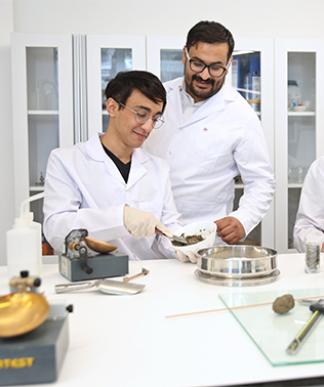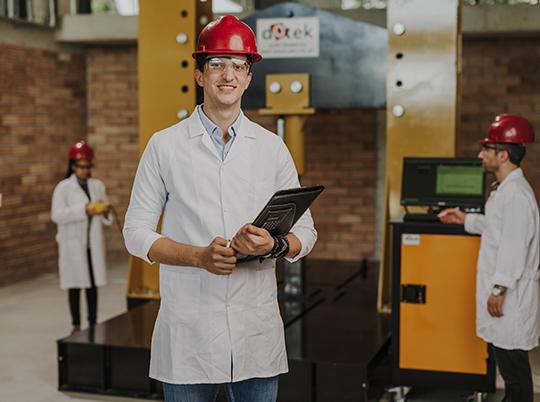


About the Program
Ph.D. in Civil Engineering program covers the fields of structural engineering, geotechnical engineering, hydrology, and material and construction management. Due to the importance of applied learning, our program is among the top institutions that utilizes state-of-the-art research and development laboratories and computer laboratories. Our program offers an education in realization of the importance to generate ethical, entrepreneurial, environmentally-responsible, technologically advanced graduates for national and international platforms of the field of civil engineering without wavering from high-quality educational standards.
Ph.D. in Civil Engineering degree is designed to raise research specialists in the areas of material, geotechnical, structural, clean/waste water and construction management. Purpose of this education is not only to educate research specialists who are up-to-date with necessary engineering and technological knowledge and have the ability to adapt to the new knowledge; but also to have graduates who can advance the field of civil engineering by effectively using their knowledge, self-confidence, communication and research skills they have gained throughout their education.
Education Opportunities
Materials, Geotechnical, Transportation, and Surveying laboratories serve Ph.D. students and help them serve their communities with their research.
Department of Civil Engineering, for use in educational and research purposes, has the following laboratories:
- Construction Materials Laboratory: latest technological equipment to explore the physical, mechanical, and durability properties of all materials that are used in the construction industry;
- Soil Mechanics Laboratory: All necessary equipment to find the physical and mechanical properties of soils;
- Central Laboratory: Equipment required to determine the chemical and mineralogical structure of composite materials;
- Transportation Laboratory: Equipment needed to determine the abrasion resistance of aggregates, CBR test, Marshall test, Viscometer, Compaction equipment;
- Computer Laboratory: Equipment having properties compatible with today’s technology and software packages to be used in designs.
The most important devices included in the laboratories include; Computer-controlled steel tension and low frequency creep detection equipment, steel reinforcement, and stirrup diameter detection equipment, concrete tomography laser, 3-dimensional laser scanning device, scanning electron microscope (SEM), and liquid chromatography-mass spectroscopy (LC-MS/MS).

Career Areas
Graduates, by fulfilling the needs of the society with the specialized education they gained, can pursue a rewarding career in any of the private and governmental educational institutions which operate in various civil engineering fields via transferring the knowledge, application methods and techniques they have learned; and by the attainment of a higher responsibility in management and leadership.
Contact
Institute of Graduate Studies and Research
Graduate Sciences and Education Center, GE106
Tel: +90 392 671 1111 Extension: 2776
Institute E-mail: ciu-institute@ciu.edu.tr
Compulsory Courses
First Semester
ELECTIVE
Course code
CVLE6X1Credit
3Theoretical
3Practical
0Ects
8ELECTIVE
Course code
CVLE6X2Credit
3Theoretical
3Practical
0Ects
8ELECTIVE
Course code
CVLE6X3Credit
3Theoretical
3Practical
0Ects
8ELECTIVE
Course code
CVLE6X4Credit
3Theoretical
3Practical
0Ects
8Second Semester
THESIS
Course code
CVLE600Credit
0Theoretical
0Practical
0Ects
160QUALIFICATION EXAM
Course code
CVLE650Credit
0Theoretical
0Practical
0Ects
20SEMINAR
Course code
CVLE690Credit
0Theoretical
0Practical
0Ects
4ELECTIVE
Course code
CVLE6X5Credit
3Theoretical
3Practical
0Ects
8ELECTIVE
Course code
CVLE6X6Credit
3Theoretical
3Practical
0Ects
8Philosophy of Science
Course code
PHIL601Credit
3Theoretical
3Practical
0Ects
8Elective Courses
ADVANCED CONCRETE TECHNOLOGY
Course code
CVLE631Credit
3Theoretical
3Practical
0Ects
HIGHWAY MATERIALS AND CONSTRUCTION
Course code
CVLE552Credit
3Theoretical
3Practical
0Ects
ADVANCED DURABILITY OF BUILDING MATERIALS
Course code
CVLE632Credit
3Theoretical
3Practical
0Ects
TRANSPORTATION MODELING AND PLANNING
Course code
CVLE551Credit
3Theoretical
3Practical
0Ects
0RESEARCH METHODS
Course code
EMNT525Credit
3Theoretical
3Practical
0Ects
0PROJECT MANAGEMENT
Course code
CVLE694Credit
3Theoretical
3Practical
0Ects
5ADVANCED PAVEMENT MANAGEMENT SYSTEM
Course code
CVLE666Credit
3Theoretical
3Practical
0Ects
0CONSTRUCTION TECHNOLOGY I
Course code
CVLE696Credit
3Theoretical
3Practical
0Ects
CONSTRUCTION PLANNING AND SCHEDULING
Course code
CVLE561Credit
3Theoretical
3Practical
0Ects
ADVANCED STRUCTURAL DESIGN
Course code
CVLE642Credit
3Theoretical
3Practical
0Ects
ADVANCED UNSATURATED SOILS
Course code
CVLE657Credit
3Theoretical
3Practical
0Ects
ADVANCED RESEARCH METHODS FOR ENGINEERING
Course code
ENGI660Credit
3Theoretical
3Practical
0Ects
8WATER QUALITY MANAGEMENT
Course code
CVLE622Credit
3Theoretical
3Practical
0Ects
CONCRETE TECHNOLOGY
Course code
CVLE532Credit
3Theoretical
3Practical
0Ects
0EARTH RETAINING STRUCTURES
Course code
CVLE616Credit
3Theoretical
3Practical
0Ects
CONSTRUCTIN RISK MANAGEMENT
Course code
CVLE662Credit
3Theoretical
3Practical
0Ects
GEOTECHNICAL INVESTIGATION
Course code
CVLE512Credit
3Theoretical
3Practical
0Ects
ADVANCED SOIL MECHANICS LABORATORY
Course code
CVLE615Credit
3Theoretical
3Practical
0Ects
SYSTEMS ENGINEERING
Course code
CVLE601Credit
3Theoretical
3Practical
0Ects
5ADVANCED SOILD MECHANICS II
Course code
CVLE612Credit
3Theoretical
3Practical
0Ects
CONSTRUCTION QUALITY, PRODUCTIVITY AND SAFETY
Course code
CVLE661Credit
3Theoretical
3Practical
0Ects
TOTAL QUALITY MANAGEMENT
Course code
EMNT502Credit
3Theoretical
3Practical
0Ects
0SOIL DYNAMICS
Course code
CVLE614Credit
3Theoretical
3Practical
0Ects
High Rise Buildings
Course code
CVLE548Credit
3Theoretical
3Practical
0Ects
0ENERGY EFFICIENCY IN BUILDINGS
Course code
CVLE569Credit
3Theoretical
3Practical
0Ects
8SUSTAINABLE CONCRETE PRODUCTION
Course code
CVLE558Credit
3Theoretical
3Practical
0Ects
8QUALITY ENGINEERING
Course code
EMNT509Credit
3Theoretical
3Practical
0Ects
0HIGH RISE BUILDINGS
Course code
CVL548Credit
3Theoretical
3Practical
0Ects
0SUSTAINABLE BUILT ENVIRONMENT
Course code
CVLE637Credit
3Theoretical
3Practical
0Ects
8STATISTICS AND DATA ANALYSIS
Course code
BIOE605Credit
3Theoretical
3Practical
0Ects
COMPUTER APPLICATIONS IN HYDRAULICS
Course code
CVLE517Credit
3Theoretical
3Practical
0Ects
ADVANCED GEOTECHNICAL ENGINEERING
Course code
CVLE619Credit
3Theoretical
3Practical
0Ects
ADVANCES IN MATERIAL SCIENCE
Course code
CVLE635Credit
3Theoretical
3Practical
0Ects
Philosophy of Science
Course code
PHIL601Credit
3Theoretical
3Practical
0Ects
8SPECIAL TOPICS IN CIVIL ENGINEERING
Course code
CVLE502Credit
3Theoretical
3Practical
0Ects
ADVANCED SOIL MECHANICS I
Course code
CVLE511Credit
3Theoretical
3Practical
0Ects
ADVANCED MATERIALS SCIENCE
Course code
CVLE531Credit
3Theoretical
3Practical
0Ects
MODERN ECONOMIC ISSUES IN ENERGY SYSTEMS
Course code
ENRE527Credit
3Theoretical
3Practical
0Ects
MATERIALS TESTING AND MEASUREMENTS
Course code
CVLE536Credit
3Theoretical
3Practical
0Ects
ADVANCED FOUNDATION ENGINEERING
Course code
CVLE617Credit
3Theoretical
3Practical
0Ects
0PROBABILITY THEORY AND STOCHASTIC PROCESSES
Course code
EELE612Credit
3Theoretical
3Practical
0Ects
STRUCTURAL ANALYSIS-II
Course code
CVLE374Credit
0Theoretical
0Practical
0Ects
STRUCTURAL ANALYSIS I
Course code
CVLE341Credit
0Theoretical
0Practical
0Ects
FUNDAMENTALS OF REINFORCED CONCRETE
Course code
CVLE372Credit
0Theoretical
0Practical
0Ects
REINFORCED CONCRETE DESIGN
Course code
CVLE471Credit
0Theoretical
0Practical
0Ects
FOUNDATION DESIGN
Course code
CVLE451Credit
0Theoretical
0Practical
0Ects
PROJECT SCHEDULING
Course code
EMNT503Credit
3Theoretical
3Practical
0Ects
RESEARCH TEHCNIQUES IN HUMAN ENGINEERING
Course code
EMNT516Credit
3Theoretical
3Practical
0Ects
SUPPLY CHAIN MANAGEMENT
Course code
EMNT524Credit
3Theoretical
3Practical
0Ects
ADVANCED TOPICS IN AIR POLLUTION
Course code
ENVE611Credit
3Theoretical
3Practical
0Ects
ENVIRONMENTAL MANAGEMENT SYSTEMS
Course code
CVLE665Credit
3Theoretical
3Practical
0Ects
SPECIAL TOPICS IN ENVIRONMENTAL ENGINEERING
Course code
ENVE633Credit
3Theoretical
3Practical
0Ects
QUALITATIVE AND QUANTITAIVE RESEARCH METHODS
Course code
BUSN636Credit
3Theoretical
3Practical
0Ects
ENGINEERING MECHANICS II
Course code
CVL212Credit
0Theoretical
0Practical
0Ects
CONSTRUCTION MANAGEMENT
Course code
CVLE491Credit
0Theoretical
0Practical
0Ects
ECONOMIC AND STAKEHOLDER ANALYSIS
Course code
BUSN623Credit
3Theoretical
3Practical
0Ects
7Students who are interested in pursuing advanced graduate studies leading to a master’s, doctoral degree or professional doctorate degree for the Fall and Spring semesters every year. Applicants can directly apply online to our graduate programs using the application portal.
TR Applicants- Required documents:
- Bachelor’s and Master’s Degree Diploma
- Bachelor’s and Master’s Degree transcripts for each completed academic term/year.
- Valid ALES result in document (must not exceed 5 years),
- Documents to prove English proficiency for English language departments,
- Scanned copy of passport or identity card.
Click for detailed admission requirements information.
TRNC Applicants- Required documents:
- Bachelor’s and Master’s Degree Diploma
- Bachelor’s and Master’s Degree transcripts for each completed academic term/year.
- Documents to prove English proficiency for English language departments,
- Scanned copy of passport or identity card.
Click for detailed admission requirements information.
Students who are interested in pursuing advanced graduate studies leading to a master’s, doctoral degree or professional doctorate degree for the Fall and Spring semesters every year. Applicants can directly apply online to our graduate programs using the application portal.
International Applicants- Required documents:
- A valid Bachelor’s Degree and transcripts for each completed academic term/year.
- A valid Master’s Degree and transcripts for each completed academic term/year.
- Evidence of English Language competence: TOEFL (65 IBT) or IELTS (5.5). Students without these documents will take the CIU English proficiency exam on campus following arrival.
- Scanned copy of international passport/birth certificate
- CV
- PhD research proposal
- Fully completed and signed CIU Rules and Regulations document (which can be downloaded during the online application)
Click for detailed admission requirements information.
Cyprus International University provides academic scholarships for its students as an incentive for success, with most students benefiting from 50%, 75% or 100% scholarships or discounted tuition fees. Click for more information.
Tuition Fees are determined at the beginning of each academic year. Candidate students who are entitled to enroll in CIU can learn their fees in line with the Tuition Fee Calculation system.